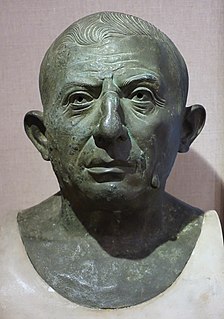Related Research Articles
This article concerns the period 69 BC – 60 BC.
The Caecilii Metelli were one of the most important families of the late Roman Republic. They rose to prominence in the beginning of the third century, with the consulship of Lucius Caecilius Metellus Denter in 284 BC. It was however Quintus Caecilius Metellus, consul in 143, who greatly improved the prestige of the family, notably thanks to his victory during the Fourth Macedonian War, for which he received the agnomen Macedonicus. His descendants and those of his younger brother Lucius received an astonishing number of magistracies during the last century of the Republic.
Quintus Caecilius Metellus Numidicus was an ancient Roman statesman and general, he was a leader of the Optimates, the conservative faction of the Roman Senate. He was a bitter political opponent of Gaius Marius. He was consul in 109 BC, in that capacity he commanded the Roman forces in Africa during the Jugurthine War. In 107 BC he was displaced from his command by Marius. On his return he was granted a triumph and the cognomen Numidicus. He later became a censor, entering into exile in opposition to Marius. Metellus Numidicus enjoyed a reputation for integrity in an era when Roman politics was increasingly corrupt.

Quintus Caecilius Metellus Macedonicus was a statesman and general of the Roman Republic during the second century BC. He was praetor in 148 BC, consul in 143 BC, the Proconsul of Hispania Citerior in 142 BC and censor in 131 BC. He got his agnomen, Macedonicus, for his victory over the Macedonians in the Fourth Macedonian War.
"In Verrem" is a series of speeches made by Cicero in 70 BC, during the corruption and extortion trial of Gaius Verres, the former governor of Sicily. The speeches, which were concurrent with Cicero's election to the aedileship, paved the way for Cicero's public career.

Imperium is a 2006 novel by English author Robert Harris. It is a fictional biography of Cicero, told through the first-person narrator of his secretary Tiro, beginning with the prosecution of Verres.
Servilia was the wife of Quintus Lutatius Catulus, the consul during 102 BC. She was of the patrician Caepione branch of the Servilia gens.
Quintus Caecilius Metellus Celer, a member of the powerful Caecilius Metellus family who were at their zenith during Celer's lifetime. A son of Quintus Caecilius Metellus Nepos, or, according to some, the son of tribune Quintus Caecilius Metellus Celer while the latter is the son of Quintus Caecilius Metellus Nepos, was an ancient Roman statesman and general during the First Century BC. He became consul in 60 BC and previously he held the offices of praetor and augur.
Lucius Caecilius Metellus Calvus was a Roman statesman. He was a son of Quintus Caecilius Metellus and brother of Quintus Caecilius Metellus Macedonicus. First Calvus used to be a Praetor, later a Consul and Governor of Hispania in 142 BC, where he fought, without success, against Viriathus, then he became a Proconsul of Cisalpine Gaul in 141 BC, and from 140 BC to 139 he was a Legate. Also during those years, Calvus participated in an embassy to some Eastern states.
Lucius Caecilius Metellus was the son of Lucius Caecilius Metellus Denter. He was Consul in 251 BC and 247 BC, Pontifex Maximus in 243 BC and Dictator in 224 BC.

Quintus Caecilius Metellus was a pontiff in 216 BC, aedile of the plebeians in 209 BC, curule aedile in 208 BC, magister equitum in 207 BC, consul in 206 BC, dictator in 205 BC, proconsul of Bruttium in 204 BC, and an ambassador at the court of Philip V of Macedon in 185 BC.
Marcus Caecilius Metellus was a Roman senator and general. He belonged to the Caecilii Metelli, one of the most prominent aristocratic families in the mid to late Roman Republic. Marcus was the third of four sons of Quintus Caecilius Metellus Macedonicus.
Quintus Caecilius Metellus Balearicus was a Roman statesman and general who was elected consul for the year 123 BC.
Gaius Caecilius Metellus Caprarius was a consul of the Roman Republic in 113 BC with Gnaeus Papirius Carbo. He served under Scipio Aemilianus in Numantia around 133 BC. He was praetor in 117 BC. His proconsulship in Thrace in 112–111 BC earned him a triumph. He was censor in 102 BC with his cousin, Quintus Caecilius Metellus Numidicus.
Quintus Caecilius Metellus Creticus was a politically active member of the Roman upper class. He was praetor in 74 BC and pontifex from 73 BC until his death. He was consul in 69 BC along with Quintus Hortensius Hortalus.
Publius Cornelius Scipio Nasica was a politician of the Roman Republic. He belonged to the great patrician family of the Cornelii Scipiones, and was the son of the pontifex maximus Nasica Serapio, who famously murdered Tiberius Gracchus in 133 BC. Nasica was on track to a prestigious career like most of his ancestors, being praetor in 118 BC, but he died during his consulship in 111 BC.
Quintus Pompeius was the name of various Romans from the gens Pompeia, who were of plebeian status. They lived during the Roman Republic and Roman Empire.

The gens Caecilia was a plebeian family at ancient Rome. Members of this gens are mentioned in history as early as the fifth century BC, but the first of the Caecilii who obtained the consulship was Lucius Caecilius Metellus Denter, in 284 BC. The Caecilii Metelli were one of the most powerful families of the late Republic, from the decades before the First Punic War down to the time of Augustus.
References
- Broughton, T. Robert. Magistrates of the Roman Republic Vol. 2. New York: American Philological Association. 1952. 71, 122, 137.
- Salazar, Christine F. Brill's New Pauly: Encyclopedia of the Ancient World Vol 2. Boston: Brill Leiden. 2003. 874–879.